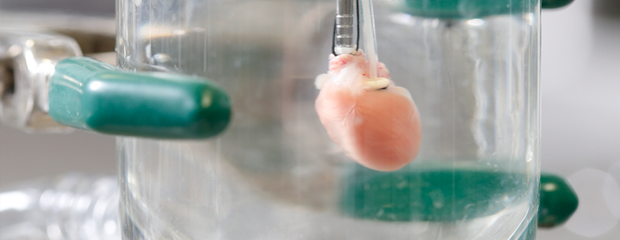Research Interests
Gut bacteria to treat the progression of heart disease
There is a significant unmet clinical need to identify novel therapies to prevent and treat the progression of heart disease. This requires identification of additional contributory processes to its pathogenesis so that mechanism-based interventions may be developed. Researchers at the Medical College of Wisconsin have translated the recently discovered mechanistic link in rats between changes in the intestinal microbiota and the pathogenesis of cardiovascular disease to humans. Their discovery of a relationship between a probiotic intestinal bacterium, Lactobacillus plantarum 299v, improved vascular endothelial function and decreased inflammation indicates intestinal microbiota may be developed as therapies to prevent and treat the progression of cardiovascular disease.
Protecting adult hearts against injury during a heart attack
New studies have shown that thrombopoietin, a naturally occurring protein being developed as a pharmaceutical to increase platelet count in cancer patients during chemotherapy, can also protect the heart against injury during a heart attack. Currently there are no therapies available to directly protect the heart against the damaging effects of a heart attack. Dr. Baker's team has shown that administering a single dose of thrombopoietin to rats during a heart attack decreased the extent of permanent muscle damage to the heart and increased the ability of the heart to function afterwards, when compared with no drug treatment. Additionally, Dr. Baker and his colleagues found that a single cardioprotective treatment with thrombopoietin did not increase platelet count. This novel finding suggests the cardioprotective actions of thrombopoietin are separate from its ability to increase platelet count. Dr. Baker has been awarded a US patent on the tissue protective properties of thrombopoietin.
Radiation injury to the cardiovascular system
The Foundation has supported a research program that is actively investigating the effect of radiation on the cardiovascular system. There is an urgent need to understand the risk of injury to vital organs, such as the heart, following a radiological terrorist attack or nuclear accident, define the mechanisms underlying the injury, and devise treatment strategies. The extent to which exposure to 10 Gy total body irradiation (TBI), a potentially survivable dose in a radiation accident or radiological terrorism event, results in injury to the cardiovascular system is unknown. Studies have shown that a single TBI exposure with a dose of 10 Gy results in a time dependent increase in serum total cholesterol, LDL cholesterol, and triglycerides, all of which are biomarkers for the increased risk for cardiovascular disease. Hypercholesterolemia is associated with morphological injury to the vascular endothelium resulting in fibrosis, decreased density of the smaller diameter coronary vessels, and a decrease in ventricular mechanical function at 120 days following TBI. This work has been supported by a grant from the National Institute of Allergy and Infectious diseases to determine the impact of radiation on the heart.
Protecting children's hearts during surgical repair of cyanotic congenital birth defects
Each year over 40,000 children are born in the United States with a congenital heart defect, of which 30,000 will require corrective surgery. Open heart surgery has become a common daily practice in our country, but mortality rates for children undergoing these types of operations are far higher than for adults.
The Foundation for Heart Science supports research that protects children's hearts during surgical repair of congenital birth defects. Results of these studies will contribute to our understanding of how to improve protection of the child's heart during cardiac surgery and will improve the clinical management of children with cyanotic heart disease.
The Foundation supports research into drugs that protect the heart against injury from ischemia/reperfusion. Researchers have conducted a clinical trial at Children's Hospital of Wisconsin to demonstrate the ability of a protein to protect the child's heart during surgical repair of congenital heart defects. Information gained from these studies is providing needed insight to conduct translational research – the development of innovative approaches to the diagnosis, treatment and prevention of cardiovascular disease.

